EV tax credit continues: While still awaiting signature by the president, the comprehensive tax bill does keep the current tax credit alive. Electric vehicle owners 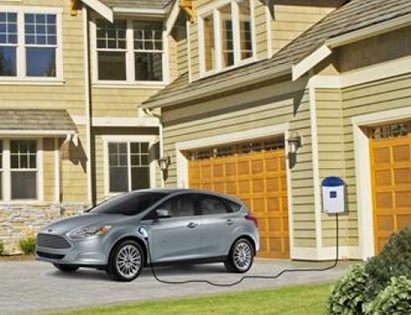 will still be able to claim a tax credit up to $7,500 on the purchase. The 200,000 unit cap will still be in place with Tesla, General Motors, and Nissan expected to hit that ceiling sometime next year. Automakers and organizations such as CALSTART and Plug In America had been lobbying for inclusion of the tax credit, which had been initially cut from a House tax bill.
will still be able to claim a tax credit up to $7,500 on the purchase. The 200,000 unit cap will still be in place with Tesla, General Motors, and Nissan expected to hit that ceiling sometime next year. Automakers and organizations such as CALSTART and Plug In America had been lobbying for inclusion of the tax credit, which had been initially cut from a House tax bill.
Musk’s accidental tweet: Tesla CEO Elon Musk received a wave of phone calls yesterday when he accidentally sent out his phone number to his 16.7 million Twitter followers. He’d been intending to send out the number to John Carmack, chief technology officer at Facebook’s Oculus virtual reality division. Several people tried calling his phone number and reported hearing a voicemail message from Musk stating, “By the Gods you’ve done it. Somehow you’ve found your way here to me. I offer you my congratulations and my respect.”
Uber loses big lawsuit in Europe: Uber is legally defined as a transport company, according to a ruling this week by the European Court of Justice. The ride-hailing giant 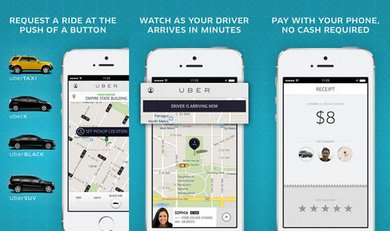 had argued that it merely provides a mobile app linking riders to car owners, and not a taxi or livery company. The case had come out after Barcelona ruled that Uber was to obey local taxi rules in that city. Uber downplayed the court ruling, saying that the company already operates under transportation laws in most European Union countries. Analysts say the ruling will have serious implications for Uber and other similar companies operating in the new gig economy. Uber and its new management team have a set of challenges to face after going through a difficult year.
had argued that it merely provides a mobile app linking riders to car owners, and not a taxi or livery company. The case had come out after Barcelona ruled that Uber was to obey local taxi rules in that city. Uber downplayed the court ruling, saying that the company already operates under transportation laws in most European Union countries. Analysts say the ruling will have serious implications for Uber and other similar companies operating in the new gig economy. Uber and its new management team have a set of challenges to face after going through a difficult year.

 played an order for 125 of Tesla’s new all-electric Semi tractors. It falls into the company’s extensive clean transportation fleet that includes vehicles powered by electricity, natural gas, and propane. Tesla Semis are poised to usher in a new era in improved safety, reduced environmental impact, and reduced cost of ownership, UPS said in a statement. Last week, PepsiCo Inc. had placed the largest Semi order with Tesla at 100 units in its efforts to reduce fuel costs and fleet emissions.
played an order for 125 of Tesla’s new all-electric Semi tractors. It falls into the company’s extensive clean transportation fleet that includes vehicles powered by electricity, natural gas, and propane. Tesla Semis are poised to usher in a new era in improved safety, reduced environmental impact, and reduced cost of ownership, UPS said in a statement. Last week, PepsiCo Inc. had placed the largest Semi order with Tesla at 100 units in its efforts to reduce fuel costs and fleet emissions. Group, will become chairman of the high-speed transportation company. Branson joined the board of directors in October after Virgin Group invested in the company. The company has also completed its third phase of testing achieving historic test speeds of 387 kilometers per hour (240.4 miles per hour). Branson is internationally known for achievements in air, rail, and space transportation, and his commitment to sustainability.
Group, will become chairman of the high-speed transportation company. Branson joined the board of directors in October after Virgin Group invested in the company. The company has also completed its third phase of testing achieving historic test speeds of 387 kilometers per hour (240.4 miles per hour). Branson is internationally known for achievements in air, rail, and space transportation, and his commitment to sustainability.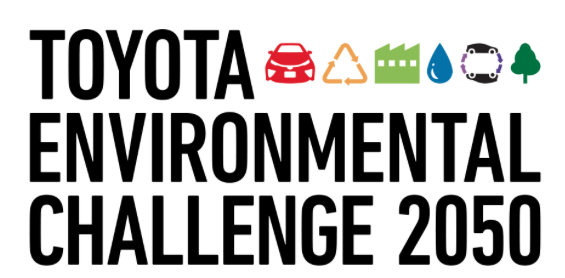 vehicles (all-electric and fuel cell vehicles). By 2025, the automaker will have every Toyota and Lexus model available as a dedicated electrified vehicle or it will have an electrified option available. Electrified options include all-electric, plug-in hybrid, fuel cell, or hybrid. During the 2020s, the PHEV lineup will be expanded and more than 10 battery electric vehicle models will be available worldwide by the early 2020s; and passenger and commercial FCEVs will be expanded during that time period. Hybrids will receive further development of the Toyota Hybrid System II. It all ties into the Toyota Environmental Challenge 2025 addressing global warming, air pollution, and limited natural resources and energy supply.
vehicles (all-electric and fuel cell vehicles). By 2025, the automaker will have every Toyota and Lexus model available as a dedicated electrified vehicle or it will have an electrified option available. Electrified options include all-electric, plug-in hybrid, fuel cell, or hybrid. During the 2020s, the PHEV lineup will be expanded and more than 10 battery electric vehicle models will be available worldwide by the early 2020s; and passenger and commercial FCEVs will be expanded during that time period. Hybrids will receive further development of the Toyota Hybrid System II. It all ties into the Toyota Environmental Challenge 2025 addressing global warming, air pollution, and limited natural resources and energy supply.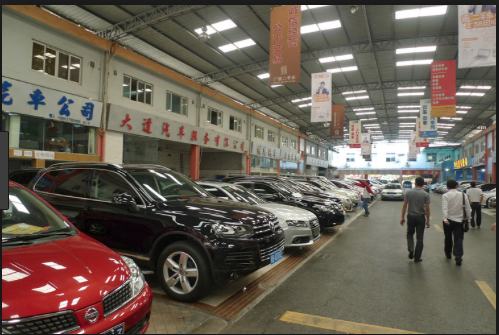 Energy Finance has projected that total annual global sales will exceed 1 million units for the first time in 2017. About 287,000 units were sold in the third quarter, up 63% over Q3 2016. China has seen about half of these sales as the government continues to incentive new energy vehicles and automakers roll out more offerings.
Energy Finance has projected that total annual global sales will exceed 1 million units for the first time in 2017. About 287,000 units were sold in the third quarter, up 63% over Q3 2016. China has seen about half of these sales as the government continues to incentive new energy vehicles and automakers roll out more offerings.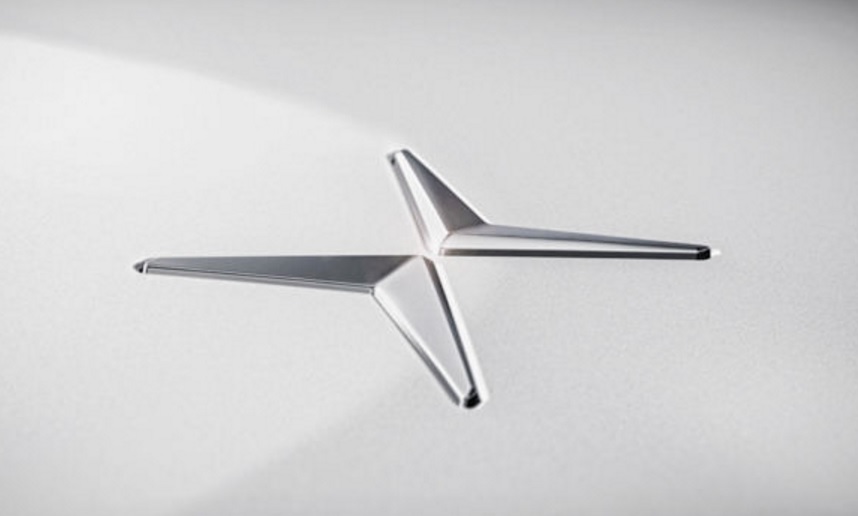 subscription service. The company said that since the launch in October, enthusiasm has been high enough to sell off the early production volume. The first model, the Polestar 1, will be start production in mid-2019 at a new factory in Chengdu, China. The monthly subscription cost will be $2,000 for the entry-level Launch package that covers registration, insurance, and maintenance, with no deposit required. The Polestar 1 has a 600 horsepower electric performance hybrid powertrain. It will be the longest running battery-only plug-in hybrid out there with the ability to go 150 kilometers (93.2 miles) on battery power.
subscription service. The company said that since the launch in October, enthusiasm has been high enough to sell off the early production volume. The first model, the Polestar 1, will be start production in mid-2019 at a new factory in Chengdu, China. The monthly subscription cost will be $2,000 for the entry-level Launch package that covers registration, insurance, and maintenance, with no deposit required. The Polestar 1 has a 600 horsepower electric performance hybrid powertrain. It will be the longest running battery-only plug-in hybrid out there with the ability to go 150 kilometers (93.2 miles) on battery power.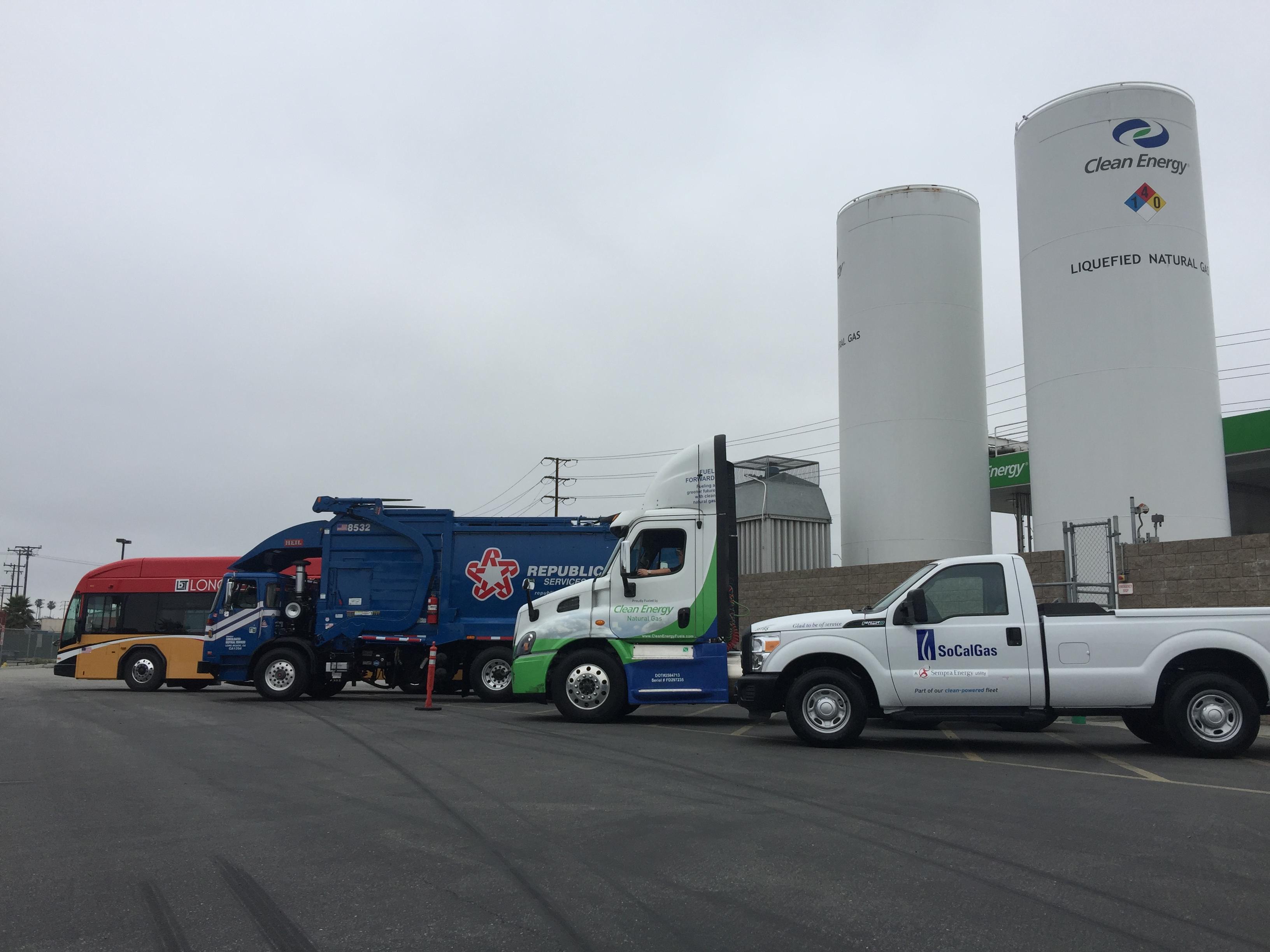 California Air Resources Board for its 2018 L9N and B6.7N natural gas engines. Both engines meet CARB optional Low NOx standards, as well as 2017 EPA greenhouse gas emission requirements. That makes them some of the cleanest engines available today for truck and bus customers, according to the company. It will be of interest to truck and bus fleets investing in powertrains for future vehicles tapping into the full emission-reduction benefits of renewable natural gas. The L9N is certified to the CARB optional Low NOx standard of 0.02 g/bhp-hr ‒ a 90% reduction from engines operating at the current EPA NOx limit of 0.2 g/bhp-hr, and is available with ratings from 250 to 320 horsepower and 1,000 lb.-ft. peak torque. The B6.7N is certified to the CARB optional Low NOx standard of 0.1 g/bhp-hr – a 50% reduction from current EPA levels. It’s available with ratings from 200 – 240 hp and 560 lb.-ft. peak torque.
California Air Resources Board for its 2018 L9N and B6.7N natural gas engines. Both engines meet CARB optional Low NOx standards, as well as 2017 EPA greenhouse gas emission requirements. That makes them some of the cleanest engines available today for truck and bus customers, according to the company. It will be of interest to truck and bus fleets investing in powertrains for future vehicles tapping into the full emission-reduction benefits of renewable natural gas. The L9N is certified to the CARB optional Low NOx standard of 0.02 g/bhp-hr ‒ a 90% reduction from engines operating at the current EPA NOx limit of 0.2 g/bhp-hr, and is available with ratings from 250 to 320 horsepower and 1,000 lb.-ft. peak torque. The B6.7N is certified to the CARB optional Low NOx standard of 0.1 g/bhp-hr – a 50% reduction from current EPA levels. It’s available with ratings from 200 – 240 hp and 560 lb.-ft. peak torque.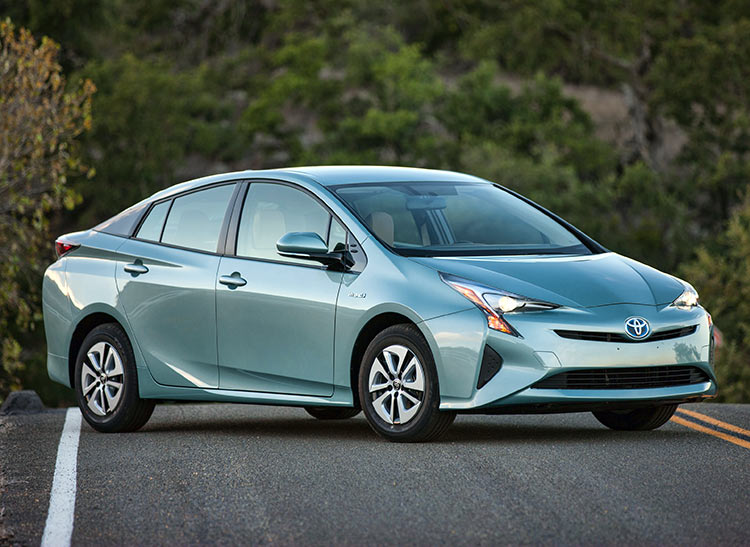 Analysis results today showing a change in the market over the past year with consumers finding more options in fuel-efficient hybrids. The percentage of cost-effective hybrids has increased 16 percentage points compared to the 2016 study. For 26 of the 65 hybrids evaluated, or 40%, these hybrids have a lower total cost of ownership compared to their closest all-gasoline powered counterpart. Since 2012 the percentage of cost-effective hybrids had steadily decreased with the trend changing this year. Luxury hybrids had the highest percentage of cost-effective hybrids at 46%, The Lexus CT200h had the largest savings in the study, showing that buyers could save $7,750 over five years of ownership compared to the similarly equipped Lexus IS 200t.
Analysis results today showing a change in the market over the past year with consumers finding more options in fuel-efficient hybrids. The percentage of cost-effective hybrids has increased 16 percentage points compared to the 2016 study. For 26 of the 65 hybrids evaluated, or 40%, these hybrids have a lower total cost of ownership compared to their closest all-gasoline powered counterpart. Since 2012 the percentage of cost-effective hybrids had steadily decreased with the trend changing this year. Luxury hybrids had the highest percentage of cost-effective hybrids at 46%, The Lexus CT200h had the largest savings in the study, showing that buyers could save $7,750 over five years of ownership compared to the similarly equipped Lexus IS 200t.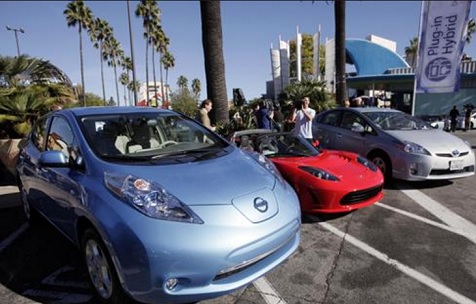 ozzella, president of the Association of Global Automakers, made the argument that California is favoring electric and fuel cell vehicles over more practical advanced gasoline engines, lighter materials, and other technologies to reduce fuel consumption and greenhouse gas emissions. While automakers have supported the ZEV mandate adopted by California and nine other states, automakers are hoping the Trump administration and Congress will soften he standards. ”The ZEV program produces no incremental nationwide GHG emission benefits despite the high burden placed on vehicle manufacturers. Current corporate average fuel economy and GHG emissions standards already specify each manufacturer’s total fleet-wide emissions, and therefore, in a system that averages together all vehicles in a manufacturer’s fleet, the fleet-wide emissions standards act as a cap when combined with an overall compliance fleet strategy,” Bozzella said.
ozzella, president of the Association of Global Automakers, made the argument that California is favoring electric and fuel cell vehicles over more practical advanced gasoline engines, lighter materials, and other technologies to reduce fuel consumption and greenhouse gas emissions. While automakers have supported the ZEV mandate adopted by California and nine other states, automakers are hoping the Trump administration and Congress will soften he standards. ”The ZEV program produces no incremental nationwide GHG emission benefits despite the high burden placed on vehicle manufacturers. Current corporate average fuel economy and GHG emissions standards already specify each manufacturer’s total fleet-wide emissions, and therefore, in a system that averages together all vehicles in a manufacturer’s fleet, the fleet-wide emissions standards act as a cap when combined with an overall compliance fleet strategy,” Bozzella said.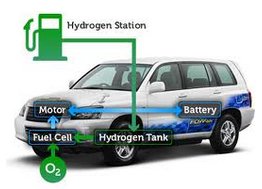 vehicle subsidies and pushing vehicle manufacturers to take light duty and heavy duty fuel cells more seriously. About 2,500 trucks and buses powered by hydrogen were deployed in 2017 compared to almost none in 2016. China faces a real challenge seen in other countries – there are only seven hydrogen fueling stations in the country with range limitations placed on the fuel cell vehicles. About 30% more fuel cell power globally was shipped in 2017 than 2016, and nearly 10,000 more units, according the the study. The study looks at three fuel segments in global markets – portable units, stationary units that provide electricity to corporate customers, and transport that includes passenger vehicles like the Toyota Mirai and heavy-duty vehicles like fuel cell transit buses. Trains and marine markets are also explored in the report, with growth seen in both sectors.
vehicle subsidies and pushing vehicle manufacturers to take light duty and heavy duty fuel cells more seriously. About 2,500 trucks and buses powered by hydrogen were deployed in 2017 compared to almost none in 2016. China faces a real challenge seen in other countries – there are only seven hydrogen fueling stations in the country with range limitations placed on the fuel cell vehicles. About 30% more fuel cell power globally was shipped in 2017 than 2016, and nearly 10,000 more units, according the the study. The study looks at three fuel segments in global markets – portable units, stationary units that provide electricity to corporate customers, and transport that includes passenger vehicles like the Toyota Mirai and heavy-duty vehicles like fuel cell transit buses. Trains and marine markets are also explored in the report, with growth seen in both sectors. forward for mobility services, according to a new study by IHS Markit, Reinventing the Wheel: Mobility and Energy Future. Much of that will come from being by far the largest auto sales market in the world, with the consulting firm forecasting 28 million new vehicles to be sold there next year versus 17.1 million in the second largest global market, the U.S. Didi Chuxing is leading the way in that market for growth in app-based mobility services, as Uber and Lyft have done in the U.S. Electrified vehicles and development of autonomous vehicle technology will also play a part in China and other markets. China had more than 234,000 new energy vehicles (all-electric and plug-in hybrid electric vehicles) sold from January through September 2017, compared to over 140,000 unites in the U.S. market.
forward for mobility services, according to a new study by IHS Markit, Reinventing the Wheel: Mobility and Energy Future. Much of that will come from being by far the largest auto sales market in the world, with the consulting firm forecasting 28 million new vehicles to be sold there next year versus 17.1 million in the second largest global market, the U.S. Didi Chuxing is leading the way in that market for growth in app-based mobility services, as Uber and Lyft have done in the U.S. Electrified vehicles and development of autonomous vehicle technology will also play a part in China and other markets. China had more than 234,000 new energy vehicles (all-electric and plug-in hybrid electric vehicles) sold from January through September 2017, compared to over 140,000 unites in the U.S. market. global markets through an alliance with Hakim Unique Group, a Chinese company. The Fisker Orbit will come through the two companies designing, developing, and integrating the Fisker autonomous, electric shuttle into the first project, a smart city implemented by Hakim Unique. Fisker will start delivering the first Orbit shuttles by the end of 2018. It’s built around a shared vision in where public transportation will be going into smart cities of the future. That will come through infrastructure, design, and EV innovation, Fisker said.
global markets through an alliance with Hakim Unique Group, a Chinese company. The Fisker Orbit will come through the two companies designing, developing, and integrating the Fisker autonomous, electric shuttle into the first project, a smart city implemented by Hakim Unique. Fisker will start delivering the first Orbit shuttles by the end of 2018. It’s built around a shared vision in where public transportation will be going into smart cities of the future. That will come through infrastructure, design, and EV innovation, Fisker said.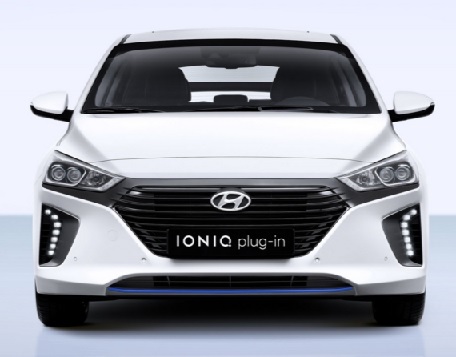 for the second year in a row in the 2018 Fuel Economy Guide with its 136 miles per gallon equivalent rating (MPGe). Published annually by the U.S. Department of Energy and Environmental Protection Agency, the guide is based on current model year vehicles. Some vehicles from last year, such as the BMW i3, didn’t make the list this year. Fuel economy information on some vehicles was not available in time to be printed in the guide. All electric vehicles are given an MPGe rating, and plug-in hybrids are ranked by their combined gasoline/electricity rating.
for the second year in a row in the 2018 Fuel Economy Guide with its 136 miles per gallon equivalent rating (MPGe). Published annually by the U.S. Department of Energy and Environmental Protection Agency, the guide is based on current model year vehicles. Some vehicles from last year, such as the BMW i3, didn’t make the list this year. Fuel economy information on some vehicles was not available in time to be printed in the guide. All electric vehicles are given an MPGe rating, and plug-in hybrids are ranked by their combined gasoline/electricity rating.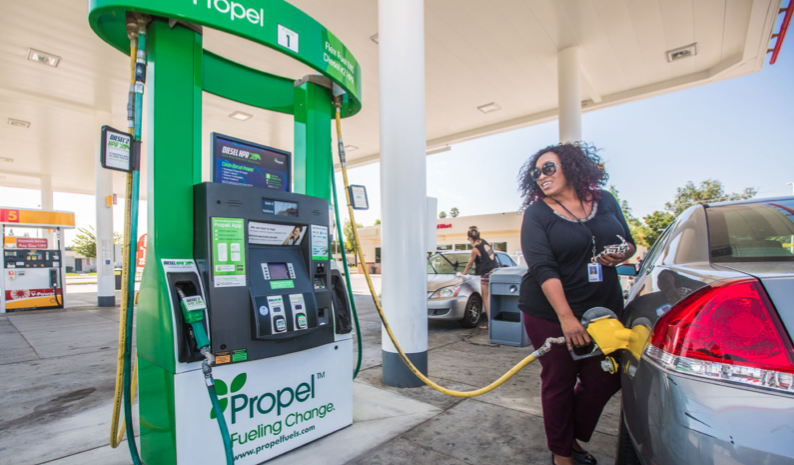 the impact of California’s Low Carbon Fuel Standard on alternative fuel consumption and the effect on emissions in the state. While targets are being met for 2020 goals, the study indicates that the current policy model will need to change to hit 2030 targets that will more than double the volume of expected low carbon fuels to five billion gallons. Propel Fuels and study partner ICF see that possible through flex fuel, high-efficiency diesel vehicles, electric vehicles, and hydrogen fuel cell vehicles. Through its network of fueling statins, Propel Fuels offers E85 made from corn and next generation sources such as switchgrass and agricultural waste material. Its stations also offer high-performance renewable diesel.
the impact of California’s Low Carbon Fuel Standard on alternative fuel consumption and the effect on emissions in the state. While targets are being met for 2020 goals, the study indicates that the current policy model will need to change to hit 2030 targets that will more than double the volume of expected low carbon fuels to five billion gallons. Propel Fuels and study partner ICF see that possible through flex fuel, high-efficiency diesel vehicles, electric vehicles, and hydrogen fuel cell vehicles. Through its network of fueling statins, Propel Fuels offers E85 made from corn and next generation sources such as switchgrass and agricultural waste material. Its stations also offer high-performance renewable diesel.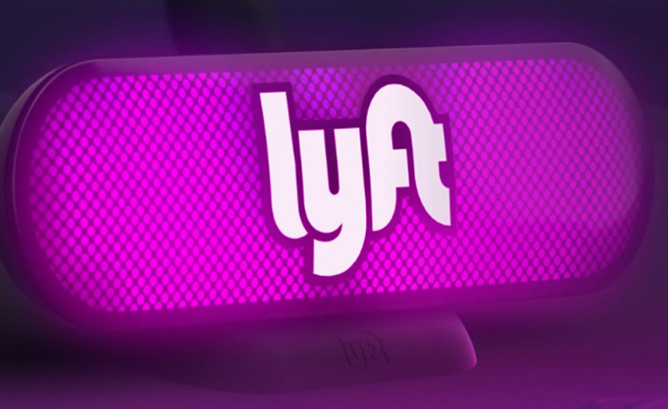 Fidelity Management & Research Company and Ontario Teachers’ Pension Plan. AllianceBernstein, Baillie Gifford, KKR, Janus Henderson Investors, and Rakuten. CapitalG led the billon-dollar round. The ride-hailing firm’s valuation is now at $11.5 billion. Alphabet, the Google parent company, played a key role in bringing in more investors for Lyft during October – after pulling away from financial support for arch-competitor Uber and filing its intellectual property theft lawsuit affecting its Waymo division……………..
Fidelity Management & Research Company and Ontario Teachers’ Pension Plan. AllianceBernstein, Baillie Gifford, KKR, Janus Henderson Investors, and Rakuten. CapitalG led the billon-dollar round. The ride-hailing firm’s valuation is now at $11.5 billion. Alphabet, the Google parent company, played a key role in bringing in more investors for Lyft during October – after pulling away from financial support for arch-competitor Uber and filing its intellectual property theft lawsuit affecting its Waymo division……………..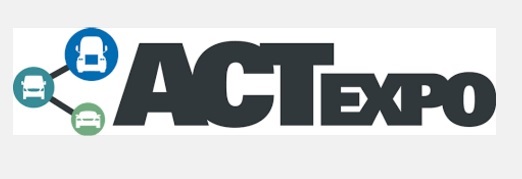 clean transportation events, GNA has played a key role in raising millions of dollars in grant funding for clients during its history. The consulting firm will celebrate its 25 year anniversary next year. The company has effectively supported the use of renewable fuels, and has provided research and analysis for all parts of the clean transportation industry. GNA also does emissions modeling, assists with technical fleet planning, monitors government affairs, and provide communications and media services to clients, CNGVC said.
clean transportation events, GNA has played a key role in raising millions of dollars in grant funding for clients during its history. The consulting firm will celebrate its 25 year anniversary next year. The company has effectively supported the use of renewable fuels, and has provided research and analysis for all parts of the clean transportation industry. GNA also does emissions modeling, assists with technical fleet planning, monitors government affairs, and provide communications and media services to clients, CNGVC said.